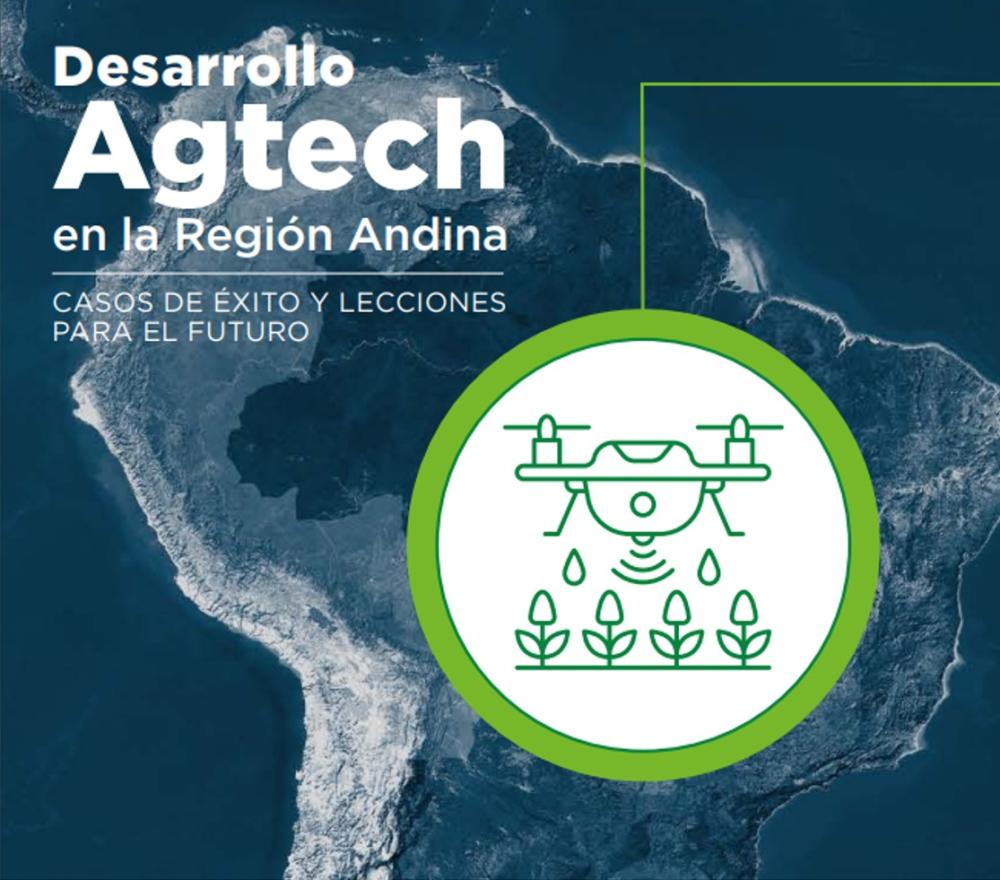The report is seeking to drive the use of digital solutions in the region’s agrifood systems, having analyzed 10 businesses to understand the challenges and opportunities that they face.

San Jose, 16 October 2023 (IICA) – Colombia is the country with the most prolific development of AgTechs in the Andean region, followed by Peru and Ecuador, according to a study on AgTech success stories and lessons learned, entitled, “Desarrollo AgTech en la Región Andina: casos de éxito y lecciones para el futuro”. The study was conducted by the Inter-American Institute for Cooperation on Agriculture (IICA) and the Inter-American Development Bank (IDB).
The assessment of the region, with a view to driving the development of these technology-based businesses and the use of their applications and innovations in agrifood systems in the Andean countries, identified 90 businesses in the AgTech sector based in the region. Colombia leads the way, with 59% of the total; followed by Peru and Ecuador, with 23% and 12% respectively.
The study is also seeking to determine the state of development and use of AgTechs in the region’s countries as a critical element in informing public policies that will foster their creation.
Renowned AgTech experts attended the presentation, which stressed the Andean agrifood systems’ capacity for growth and the central role of innovative technologies in achieving this potential, given their impact on productivity and efficiency.
The 90 AgTechs identified offer a broad spectrum of solutions, providing platforms primarily for digital trade (36.7%), applications and instruments for smart or precision agriculture (25.6%) and bioinputs (11.1%).
Fedrico Bert, Coordinator of IICA’s Digitalization of Agrifood Systems program, who co-authored the study remarked that, “The AgTech phenomenon stands to benefit the region in two ways: it creates solutions that enable farmers to increase their production and sustainability, while also generating businesses with immense potential to be scaled up and to create an impact beyond the confines of the region”.
The report—presented by Jeremías Lachman, a consultant who led the study along with Juan Andrés del Río—provides an in-depth analysis of 10 specific cases to understand the challenges and opportunities in establishing these businesses in the region.
The businesses that were studied include: Hola Tractor in Bolivia; BloomsPal Market Network and IncluirTec in Colombia; AGP Geospatial Company and BioFeeder in Ecuador; Agros and BNS in Peru; AgroCognitive in Venezuela; SIMA from Argentina and Agrosmart Brasil. The latter two have operations in the Andean countries.
Among the areas that were studied were the value propositions and production and environmental impacts of the solutions that had been developed; the background of the founding team; the process undertaken to develop the technologies on which the services are based; and also, the obstacles to growth and future prospects of the companies.
Most of the AgTechs were founded by young professionals between 20 and 40 years of age, inspired by the possibility of resolving problems affecting farmers or other agrifood stakeholders, by leveraging their own network of contacts and resources (at least in the initial stages).
The main priorities for their development were improved productivity and economic results, and secondly, environmental sustainability.
Limitations to growth
The entrepreneurs indicated that the major factors hampering the development of their AgTechs were a lack of interest and knowledge on the part of users, particularly farmers; the need to raise the awareness of and build the capacities of farmers and decision-makers; and limited access to financing.
They agreed on the need to generate opportunities to foster linkages between the various stakeholders: AgTechs, the public and private sectors, academia, farmers and their organizations, among others.
As such, they commended IICA for having providing forums for discussion and coordination and for creating a network of AgTechs from the region, through its Digitalization of Agrifood Systems program and Digital Agriculture Week, an event it has held since 2022.
Potential measures or policies to promote the development and use of innovative tech companies were proposed during the event, based on the lessons learned by leading AgTechs in the region that the study discussed in detail.
Participants in the launch event included Angelica Acosta, founder and CEO of IncluirTec, a financial services AgTech serving the Colombian agriculture sector; Hugo Piñarreta Mezones, co-founder and CEO of AGROS, a company originating in Peru that provides family farmers with a digital identity; and Elvia Gómez, Manager of Acumen, an entity that invests in startups, by enabling them to access financing.
Representing IICA at the event were Federico Villarreal, Director of Technical Cooperation; and Federico Bert, Coordinator of the Digitalization of Agrifood Systems program, who were joined by IDB representatives Osmel Manzano, Regional Economic Advisor, and Laura Giles Álvarez, Senior Economist for Colombia.
The complete study can be downloaded free of cost at IICA’s institutional repository, which can be accessed at: https://repositorio.iica.int/handle/11324/21773.
IICA conducted a similar study focusing on the Central American region.
More information:
Federico Bert, Head of IICA’s Digitalization of Agrifood Systems Program.
federico.bert@iica.int











